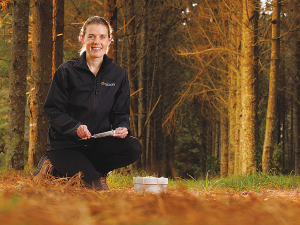ETS costs cut 66% for forest owners – McClay
Additional reductions to costs for forest owners in the Emissions Trading Scheme Registry (ETS) have been announced by the Government.
 Scientist and project lead Kathryn Walker is measuring how fast soil microbes are consuming methane by taking gas samples from field chambers installed in forests.
Scientist and project lead Kathryn Walker is measuring how fast soil microbes are consuming methane by taking gas samples from field chambers installed in forests.
Scion scientists have embarked on important new research to find out how much methane is being consumed by microorganisms in New Zealand's planted forest soils.
Forest soils are good habitats for bacteria that absorb and release methane (CH4) as a source of carbon and energy. By quantifying how much methane is consumed by the bacteria, known as methanotrphs, at field sites, the project will reveal just how important planted forest soils are to New Zealand as part of broader efforts that seek to better understand the country's total net emissions and ways to mitigate climate change.
Once complete, the research will provide valuable insights for policy makers examining greenhouse gas emissions as it can be used to paint a more accurate picture of the country's total net carbon budget.
Due to agricultural activity, methane production in New Zealand is disproportionately high on a per capita basis - about six times the global average. Understanding the potential for other land uses, such as forestry, to mitigate these agricultural emission is critical, says Scion senior scientist Dr Steve A. Wakelin.
"We know that forests are great for storing carbon from carbon dioxide, but this research is helping us learn about forestry's capability to offset methane emissions as well. We believe it is a first step in a future programme of work that will demonstrate how different land uses in New Zealand are all inter-connected, and how to manage these holistically for win-win outcomes."
He says New Zealand's economy is reliant on the livestock sector for jobs, food and income. Scion's research aims to show how forestry can support the agricultural sector to tackle one of its biggest challenges.
"Scientist are working on breeding lower methane-emitting livestock, using methane 'vaccines' and inhibitors, and investigating farming system change such as feed and additives.
"However, even combined these are unlikely to 'nudge the needle' enough to meet our emissions reduction targets.
"As Aotearoa works towards a low-carbon future, this issue is one for us to tackle together."
The Ministry for Primary Industries is funding the research, with support from Lincoln University. It follows international studies proving that forest soils create optimal conditions for the methane-absorbing microbes.
As methane in the air passes over and diffuses within forest soil, methanotrophs consume the methane.
"We find methanotrophs are abundant in our DNA-based surveys of planted forest soils," Wakelin says.
"Indeed, based on overseas systems, it turns out that planted forest soils are pretty good habitats for methanotrophs; we just haven't looked at this in New Zealand before."
Scion's Microbial Ecology - Soil Systems team is now collection New Zealand's first field-based measurements of methane flux - how fast the soil microbes are consuming methane.
Researchers have installed methane flux chambers at two field sites near Christchurch: Orton Bradley Park and McLeans Island. At both sites Scion already collects environmental DNA and measures environmental properties; this information will now be integrated with the methane flux data. Chambers have also been installed in Kaingaroa Forest in the central North Island - New Zealand’s largest commercial pine plantation.
Sampling of these field chambers will reveal how much methane the forest soil microbiome is consuming over an entire year.
“If rates of consumption are high, we need to know as this data will be important for our national carbon budget,” says Wakelin.
"Given the importance of methane as a greenhouse gas for agriculture, it could just be a case of forests to the rescue.”
Lincoln University’s Prof. Tim Clough says the collaborative research with Scion will reveal important data.
“With Scion’s expertise in forestry aligned with Lincoln University’s facilities for tracegas sampling and analysis provided through the New Zealand Greenhouse Gas Centre, we have a great partnership in place to assess the big opportunity of forest methane consumption.”
Methane is responsible for about 25% of global warming. What’s more, each molecule of methane has about 28 to 35 times greater warming potential than carbon dioxide (CO2). This means that concentrations of methane in the atmosphere have considerably more potential to alter climate change compared to the same volume of carbon dioxide.
Fonterra executive René Dedoncker is leaving the co-operative later this year to lead Australian agribusiness Elders.
Alliance Group and the Southland Stags rugby team have joined forces in a partnership that will see the the meat co-operative's farmgate brand feature on players' team kits and replica jerseys.
Fonterra's plan to expand its organic programme to the South Island is being well received by farmers, the co-op says.
Voting has started for the renewal of DairyNZ's milksolids levy.
The most successful catchment groups in NZ are those that have 'a source to sea' approach.
Associate Agriculture Minister and Manawatu dairy farmer Andrew Hoggard says the free trade agreement (FTA) negotiated with India is not a bad deal and his party, Act, will support it when it goes before Parliament.
OPINION: Fonterra may be on the verge of selling its consumer business in New Zealand, but the co-operative is not…
OPINION: What does the birth rate in China have to do with stock trading? Just ask a2 Milk Company.